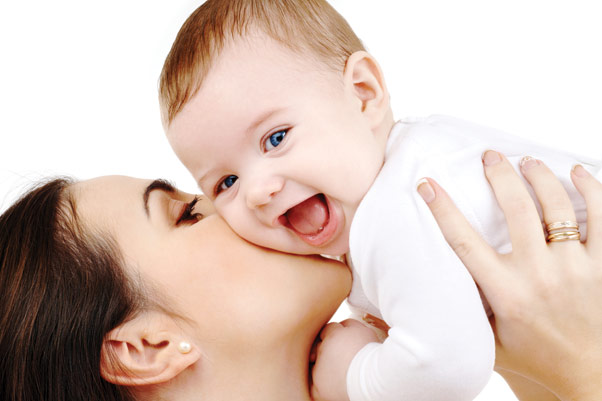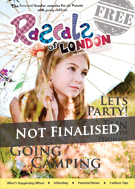After Giving Birth
By De Andrés & Goldstein Clinic for psychology, psychotherapy, and well- being
Your body has spent months nurturing and growing your baby. All the changes that helped to bring your baby into the world are now abruptly reversed.

Changes after giving birth are inevitable. Family takes on new meaning when having had your first child, and the chances are that the way you thought before having your child does not apply so well anymore; a couple of things need to be re-thought and the chances are you may have to adopt a new way of thinking.
Issues such as your Relationship to work, family, intimacy, responsibility need to be thought through again, processed for new meaning, and value allocated to them in turn. You will often hear that priorities change... that is because they do! How this happens, and the way you (partner, family and friends) handle the process of change is important. Transitions can be daunting, and you need support in making that shift in your mind from whatever was before to what is now: you and family. Below I have described a few things that may support you in this shifting thought process, give you an idea of ‘normal’ thoughts, and help you transition at a time when certain adaptation is required. This list is by no means exhaustive, please also keep in mind that the transition remains an individual and personal experience.
Family
Relationships change drastically once you have a baby, your position in the family takes on new meaning. Relatives have different expectations of you now, to be a good parent, to contribute to the education of your baby etc. They want to be involved in family life. This can be demanding, and needs a little thought to go along with informed actions. It also takes a while for grandparents to realize that they have children who have become parents (just like them!) and are not solely their children any longer. These attachment bonds that went on for so long between parent-child are renewing themselves, changing for all parties involved. The realization of change can bring more loving connections or more distant ones, the ties are generally maintained, supportive but can also be a little strenuous. Most important is to think things through up-front, explain how you feel to your parents if you can, and find help with a friend when trying to manage other’s requests of you, in what is for you, a new phase in the life of your family.
Intimacy
Intimacy is an important part of your life. Your relationship to your partner is just as important as your relationship to your baby, and if you see it that way, it will allow you to at least value your relationship when there is less time to exclusively focus on it. Intimacy is sometimes hard to maintain when a baby is so dependent and needs you 24-7... How to find time with your partner and engage in loving acts whether physical or thoughtful ones?
Of course taking care of your baby is taking care of your ‘couple’ and your growth together, but should not come at the expense of your relationship to your partner! The complicit care and love in your couple is what will remain once your child is all grown up, every step of their development children take more steps away from you, so you’ve got to keep it all in perspective... They will leave! Talk with your partner as much as you can and engage in compassion, passion and love.
Ask your partner for help if you feel snowed under, and convey your intentions, these actions will come a long way.
Responsibility
Your response-ability will now have changed, you will no longer feel responsible for yourself with a neat barrier around your actions thoughts and feelings. They will now extend to your babies actions thoughts and feelings. The physical response-ability you first feel when you have your baby is quite a change, but also so deeply felt that your body finds the ability to carry you through, after that the mind needs to start playing its part. Their mind-body connection is at no time so sharply felt! The way you think and feel when having a baby to care for is completely different; the way you see work, outings, friends, and so on and things you previously thought such as ‘being sooo very busy’ can now be thrown out of the window. Life looks so different with another pair of lenses on! Family may become more important, going to the park or taking fresh air might also be on your priority list. Things change and your value of the world does too. Make a note of these changes, small changes of the everyday, and think about the leap of faith and courage you have to muster up to brave the stormy waters.
Time
Time flies once you have a baby. Suddenly there’s no time for doing bits of work at home, cooking or enjoying a nice diner, or calling a friend. Having a baby is time consuming and the way you organised your time before, changes drastically. It takes time to get into the flow or rhythm of time again, this time incorporating childcare. When you wake up baby has to get dressed and ready for the day – you are not alone anymore! In the early evening, baby has to get ready for bed, bath, story and so on – you may have to cook something once baby is in bed, but generally speaking you will only be able to return to yourself, probably being quite tired once baby is in bed. Keep a diary with a time sheet to get an overview of your busy day, and remember; you deserve a treat too.
Feeding
Eating takes a different turn now. You are feeding baby as an ‘extension-of-yourself’, and therefore will be affected; less or more hungry depending on how feeding your baby affects you. Feeding is a form of care and love, and includes the action of ‘giving’, how do you give and love yourself at this point in time, and how much are you cared for by your partner... does your partner sometimes feed you in the evenings, or make you a coffee in the mornings? Eating can be thought of as a form of ‘give and take’; you may sometimes need more care from others, and on some other days are more able to feed others and yourself. Although there are lots of studies that show that it is the love that parents give that is of utmost importance, feeding is part of that love. Take time to eat, feed yourself the right amounts, take time to chew on food and process your day. It’s gratifying to do so.
Help
On a positive note, it is considered a normal reaction to feel down and perhaps depressed when going through times of stress, loss, and change (Paula Nicolson, 2001, advocating for the reconceptualization of postnatal depression, I recommend the book). If it may have been impossible to ask for help earlier in your life, now is the time to seek help and be on the receiving end! You will find empathy in places you hadn’t imagined, and as awareness grows of the difficulties starting a new family can entail, there will be different sources of help available to you. Your health visitor will be there the first few weeks, and here after if you wanted to call on the assisting team for support. Your GP is also generally quite a good source of support if feeling ill, or having concerns with regards to your baby. Other more specialised services are available such as talk therapy, or support from another mum through a mum’s online network, or foundation that specializes in supporting women and men with postnatal depression. There are also sleep specialists available to help with training baby to sleep well through the night if this is proving to be challenging, and some good books around to support you in understanding your child’s developmental stages, and tracking your baby’s growth.
Final words
If you opt for postnatal therapy, you will generally get emotional, practical as well as educational support in various areas to help you through this challenging time (all of the above) - and get the added personal relationship which can be healing in and of itself. Parenthood is a paradox of happiness and - pain, loss, and change, take the time to care for yourself, and you’ll find some beautiful ways to live peacefully with the challenges ahead. Dr Goldstein, is a mother and works as a therapist and lecturer in psychology. She runs the De Andrés & Goldstein Clinic for psychology, psychotherapy, and well- being in East Finchley where she supports, and offers guidance to individuals and groups through pregnancy, postnatal care and other transitions/family issues. For further enquiries contact her on: 0208 444 6831 / 0796 632 0077




